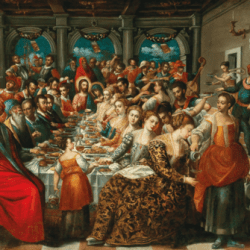I didn’t fully understand Catholic education until this semester. Those who follow the blog know I’m one of the instructors for a weekly high school economics and debate class. It’s a small class, eight students: One Orthodox, two Anglicans, the remainder Catholic.
The program hosting us is unapologetically Catholic, but it’s not a program “about” the Catholic faith. Sometimes there are classes specifically featuring religious content, sometimes there aren’t. Usually the instructors are Catholic, sometimes they aren’t. The rule that holds everything together is that nothing will be taught that is contrary to the Catholic faith, and by the way here are three different people you can talk to other than your child’s instructor if any questions of that nature should arise. I’ll speak more on this rule below.
***
What we’re teaching this year is logic and debate, personal finance, and basic economic theory. Typical high school fare. It was thrown onto the course offerings because our state generally requires a half-credit in economics; for transcript purposes, parents can choose whether to consider the debate portion a class or a club. None of the course materials happen to be “Catholic,” save a few key encyclicals tacked onto the last weeks of the syllabus, fault of what was available in a package that met the constraints we faced. At I start of the year, what I thought to myself is, “This is probably the most secular class I’ve ever taught.”
I was so, so wrong.
Because my job is to teach logic and the art of argument, my job is to teach my students how to arrive at the truth. Our goal isn’t to score points or impress people with our rhetorical skills. Our goal is to find out what is true. Period.
This is what universities were made for, literally.
People talk talk talk about universities as a place where one encounters controversial or challenging ideas, and it is true that a working university will indeed contain just that. The way that a carpenter will purchase plywood or a chef will order bushels of produce, professors haul around ideas. Raw ones. Unfinished. Some of them sporting rotten parts that need to be identified and removed.
But the purpose of the university is not to show off all those raw, uncut ideas as if they were the goal of the education; what a university does, when it does its job, is churn through ideas, sort them and test them and form them, until what is left is the truth.
It is impressive to see a tree turned into a finished piece of furniture, or the fruits of the farm turned into a meal. Surely there are moments when a carpenter poses with a half-finished project, or the chef grins while chopping the garlic; but when the carpenter says, “I play with wood,” or the chef says, “I play with food,” we only take them seriously if, in the end, there is a finished work to be savored. If a carpenter thinks his end product is sawdust, you need a new carpenter.
The idea of “truth” has gone out of fashion, particularly at the institutions so-called “universities.” This is why, and precisely why, college sucks. Every article, every protest, every controversy these days is nothing more than people discovering that modern education consists of rolling in intellectual splinters and compost.
To be Catholic is to seek the truth, and to seek the truth is to be, however imperfectly, Catholic.
***
Because we are enamored with the idea of “controversy” as if that were what education were about, some people recoil in horror at the idea that an educational institution, such as the one I teach at, would insist that all instruction be consistent with the Catholic faith. How can you test new ideas, if you have such stifling rules?
The answer is that the Catholic faith is nothing more than a collection of things we know to be true. If it is false, it is contrary to the Catholic faith. If it might be true, it is consistent with that faith.
The carpenter doesn’t find it stifling to have a rule that all finished works must be structurally sound. The chef does not find it stifling to have a rule that all meals must be edible. The “rule” is not a constraint, it is the very goal.
The same people who are so very proud of their “originality” and “daring” when it comes to ideas tend to be persistently cautious about which mushrooms belong on their salad. They care about the mushrooms because they know the wrong ones are deadly; they don’t care about the ideas, because they think that ideas have no consequence.
To be Catholic is to want to test all the mushrooms, but only consume the good ones.

Photo: The main reading room of Graz University Library (19th century) on 2 Sep 2003. Picture taken and uploaded by Dr. Marcus Gossler, (Own work) [GFDL or CC-BY-SA-3.0], via Wikimedia Commons.











